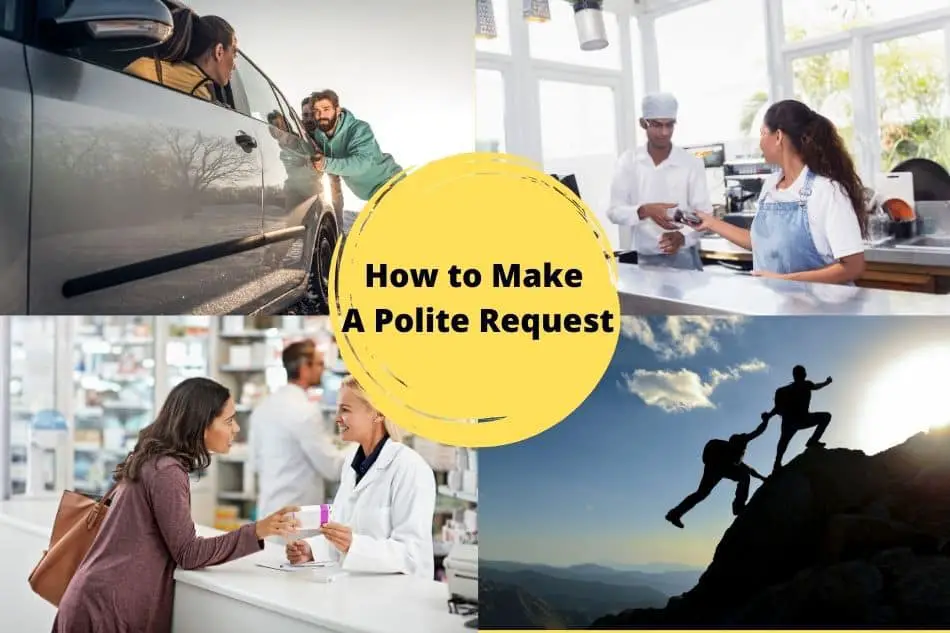This article covers the following areas –
- How to Make Polite Requests in Formal Settings
- Some Other Ways to Make Polite Requests in Formal Settings
- How to Make Polite Requests in Informal Settings
- How to Make Polite Requests in Semi-Formal Settings
- Use Your Voice Tone to Make Your Requests More Polite
- Your Body Language Makes Your Requests Even More Polite
- Sample Conversation 1: Making a Polite Request in a Formal Situation
- Sample Conversation 2: Making a Polite Request in an Informal Situation
- Final Words
- FAQ: Making Polite Requests in English
If you observe the ways native English speakers speak to someone, you will find uses of “please,” “sorry,” “excuse me,” “thanks,” and the like. These words are used by people who love being polite. Politeness is a virtue. People who are polite and are of good manners are loved by all. Their requests are earnestly considered and accepted by the people surrounding them.
Making requests means you are asking something from someone or asking someone to do something for you. Whether your request will be granted or not depends on the person you are requesting. Thus you need to request convincingly so that the person happily accepts your request. But how?
Politeness in the choice of words and expressions is the key to making requests. Using the word “please” as well as some modal verbs like “could” and “would” can have a polite effect on the request. Remember! Your tone and body language also matter when you make any request to someone.
Are you looking for a book or a guide to help you learn and improve your English? You may try English Made Easy Volume One: A New ESL Approach: Learning English Through Pictures (Amazon Link).
However, the way you make requests may vary depending on the situation: formal, informal, and semi-formal.
| Formal | Informal | Semi-formal |
| Would you please….? Would you mind…? Do you mind…? Do you think you could…? I was wondering if it would be possible to…. Is there any chance that I could…? Would it be alright if I…? | Can you…? Will you…? | Would you…? Could you…? |
Note: You may use formal expressions in semi-formal settings.
The table shows different expressions of making requests in different contexts: formal, informal, and semi-formal. Here you can also find 50 Examples of Polite Requests in English. To get to know more about the expressions, keep reading the post till the end.
How to Make Polite Requests in Formal Settings

Every day we deal with different people: family members, friends, colleagues, teachers, and students for different purposes. We meet known and unknown people in formal and informal settings and even semi-formal settings.
No matter in which situation we are, we frequently need help from others, and to have that, we make requests. In this part, I will be discussing the ways you can make polite requests in formal settings.
Would You Please…?”
Using the expression “Would you please…” is a very common expression to make requests. This expression is considered very polite. Let’s look at some example sentences.
| Would you please pass the salt? Would you please take me with you? Would you please give it to him? |
Though the above examples seem like questions, as they have a question mark (?) at the end, they are polite requests. Apparently, they look like questions, but the person you are requesting to will understand that you are actually requesting him or her to give something to you or do something for you.
Remember! When you use modal auxiliary verbs like “would” or “could,” you should use the present or base form of the verb.
Would You Mind…?
“Would You Mind” is a very polite way of making requests in formal contexts. One very important thing to mention here is that when you use “would you mind” to make requests, the verb form should be a present participle (base+ing). The following examples will make the idea clearer.
| Would you mind joining the meeting this afternoon? Would you mind writing a letter on behalf of all of us? Would you mind passing the file to me? |
Do You Mind…?
You can replace the expression “Would You Mind” with “Do You Mind.” Both can serve the same purpose of making requests in formal contexts. When you use “Do you mind” to make requests, you also use the verb’s present participle form (base+ing). The following examples would make the idea clearer.
| Do you mind joining the meeting this afternoon? Do you mind writing a letter on behalf of all of us? Do you mind passing the file to me? |
Do You Think You Could…?
You can also make requests by starting with “Do You Think You Could…” The following examples will make the idea clearer.
| Do you think you could join the meeting this afternoon? Do you think you could write a letter on behalf of all of us? Do you think you could pass the file to me? |
Remember! In formal settings, you don’t ask for anything directly. If you ask for anything directly, it may appear to be orders rather than requests.
Some Other Ways to Make Polite Requests in Formal Settings
In addition to the above expressions, there are plenty of polite expressions to make requests. Let’s have a look at some examples.
I was wondering if it would be possible for you to…
| I was wondering if it would be possible for you to send me the e-mail again. I was wondering if it would be possible for you to call me again this afternoon. I was wondering if it would be possible for you to help me with this problem. |
Is there any chance that you could…?
| Is there any chance that you could do it later? Is there any chance that you could finish the task by tonight? Is there any chance that you could arrange the meeting tomorrow? |
Would it be alright if you…?
| Would it be alright if you call me at 10 PM? Would it be alright if you attended the whole seminar? Would it be alright if you do this for me? |
How to Make Polite Requests in Informal Settings

We can use “Can’ or “Will” to make requests in informal situations. These two modal verbs sound informal compared to “would” and “could.”
When you request something from people who are known and close to you, you can use can or will. To ask something from family members, colleagues, and friends, you can use “can” and “will.”
Let’s look at the following examples.
| Can you pass the box? Can you do it for me? Can you make it happen now? Will you go there? Will you send me the files? Will you buy the things? |
Like all the other requests, these are also in question pattern. Yet, they are requests.
How to Make Polite Requests in Semi-Formal Settings

There is very little difference between semi-formal and formal settings. In semi-formal settings, we can also use the same expressions in formal settings. However, in semi-formal settings, we can use the modals “would” and “could.’
When we make requests to older family members, senior colleagues, teachers, and the like, we should use semi-formal expressions.
How to Use “Would” to Make Polite Requests in Semi-Formal Settings
“Would” is very commonly used to make polite requests in semi-formal settings. Let’s look at some example sentences.
| Would you do it for me? Would you bring him home from school? Would you send me some money? |
How to Use “Could” to Make Polite Requests in Semi-Formal Settings
Like “Would,” “Could” is also very commonly used to make polite requests when the context is semi-formal. Let’s look at the following examples.
| Could you join us today? Could you go there on my behalf? Could you call the police? |
Use Your Voice Tone to Make Your Requests More Polite
Whenever you speak, your voice tone matters. It’s not only your words but your tone that can also help to convey a message. When you request something to someone or want someone to do something for you, your tone must be polite and convincing.
If your words are polite, but the tone is even a bit rude, your request may not work as expected. Be sure that your request does not appear to be a command just because of your tone.
Your Body Language Makes Your Requests Even More Polite
Body language that includes gestures and postures is very important for sound communication. Thus, these nonverbal cues can play a vital role when making requests. Let’s quickly look at the different body language you should maintain while making requests.
- Always make eye contact. It shows that you are giving importance to the person.
- Have a positive posture all the time. It will help convince the person you request to do anything for you.
- Be polite while you move your hands or other limbs of the body. Don’t overdo it.
- Keep your facial expressions sympathetic. Naturally, if you are generous to others, they will be to you too.
- Give full attention to the person you make requests to. Listen to him or her and respond accordingly.
Sample Conversation 1: Making a Polite Request in a Formal Situation
Situation: At a business conference, Helen approaches the conference organizer, Mr. Thompson, to request additional materials.
Helen: Excuse me, Mr. Thompson, might I trouble you for some additional handouts for Session B? I believe some of my colleagues missed out.
Mr. Thompson: Of course, Helen. I’ll have someone bring them over to your table. Would that be alright?
Helen: That would be most appreciated. Thank you for your assistance.
Mr. Thompson: You’re welcome, Helen. Please let me know if there’s anything else you require.
Sample Conversation 2: Making a Polite Request in an Informal Situation
Situation: Two friends, Jake and Mia, are at a park. Mia wants Jake to take a picture of her.
Mia: Hey Jake, would you mind snapping a pic of me by the fountain? The lighting’s perfect!
Jake: Sure thing, Mia. Just stand over there and give me your best pose.
Mia: Thanks, buddy! Oh, and could you take a few so I can choose the best one?
Jake: No problem! Just let me know when you’re ready.
Final Words
Whenever you make a request, maintain an attitude that can help you accept your request. Your request should be genuine and sincere. The expressions and tips I have shared here to make polite requests properly can greatly help you to master the skill of making requests.
I hope this will help you. Thanks for reading.
Happy learning.
FAQ: Making Polite Requests in English
1. What’s the difference between “Could you…” and “Can you…” when making a request?”
Could you…” is slightly more formal and polite than “Can you…”. Both are commonly used, but “Could you…” is often preferred in more formal settings or when you’re being extra courteous.
2. Is it necessary to use “please” every time when making a request?
While it’s not always mandatory, using “please” makes your request more polite and is recommended, especially in formal situations.
3. How can I make a request sound less demanding?
Using indirect phrases like “Would it be possible…” or “If it’s not too much trouble…” can make your request sound gentler.
4. Is “Do you mind…” a polite way to ask for something?
Yes, “Do you mind…” is a polite way to make a request or ask for permission. For example, “Do you mind if I open the window?”
5. How do I respond to a polite request if I cannot fulfill it?
You can respond with phrases like “I’m sorry, but…” or “Unfortunately, I can’t…” followed by a brief reason.
6. Is it appropriate to make a request using “I want…”?
Using “I want…” can come off as demanding or rude. It’s better to use “Could I…” or “May I…” to sound more polite.
7. How do I make a request in a formal email?
Start by addressing the person respectfully, provide context, and then make your request using polite phrases. Ending with “Thank you for your consideration” can also add a touch of formality.
8. What’s the difference between “May I…” and “Might I…” when making a request?
Both are polite, but “Might I…” is less commonly used and can sound more formal than “May I…”.
9. How can I make multiple requests without sounding pushy?
You can list your requests and then add phrases like “whenever you have the time” or “at your earliest convenience” to give the other person flexibility.
10. Is it okay to repeat a request if someone hasn’t responded?
Yes, but it’s essential to wait for an appropriate amount of time and frame the repeated request politely, possibly acknowledging that you’re bringing it up again.






1 thought on “How to Make Polite Requests in English”